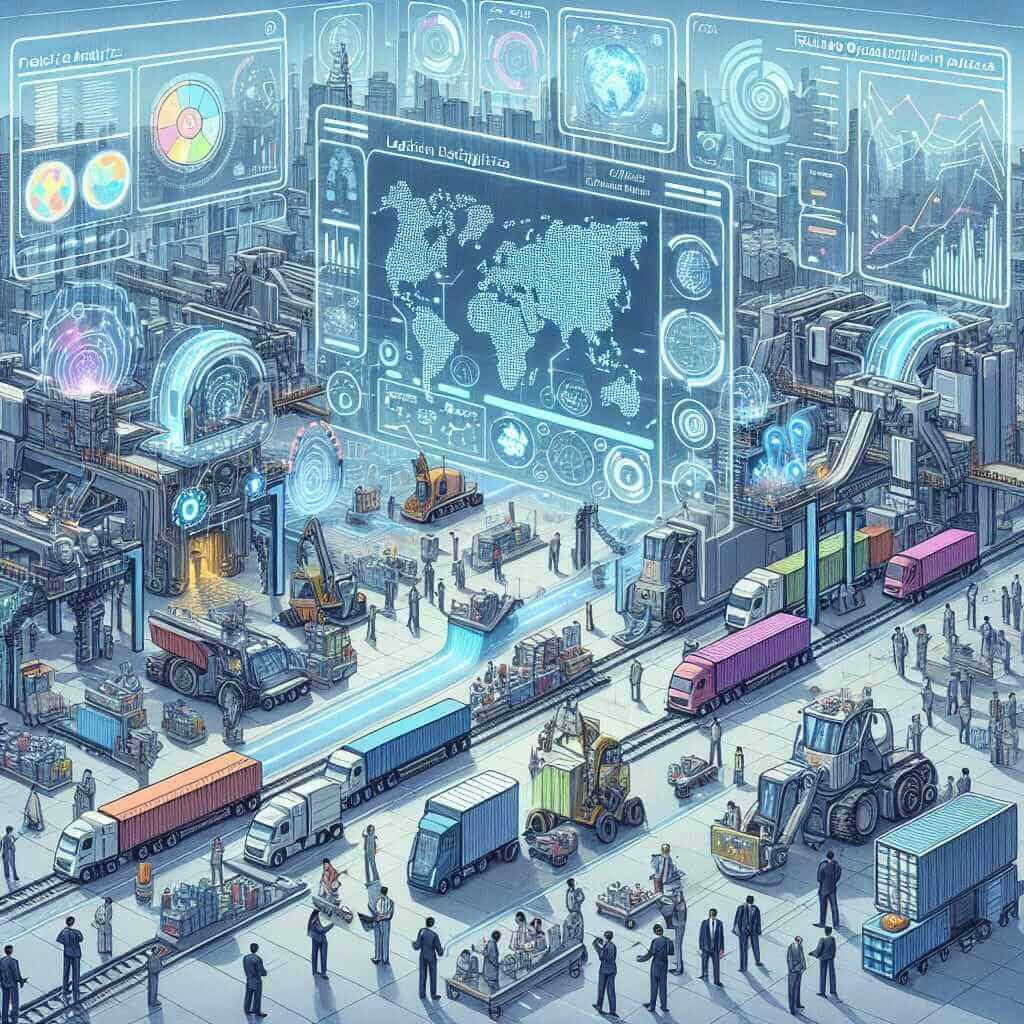The IELTS Reading test is designed to assess a wide range of reading skills, including how well you read and understand academic texts. This guide will help IELTS candidates practice reading comprehension using a text about how AI is transforming global supply chain logistics. Notably, this topic has gained significant attention due to its relevance in the modern world, suggesting it could appear in future IELTS reading tests.
Why This Topic?
With advancements in technology and increasing complexity in global logistics, understanding how AI impacts this field is not only academically beneficial but also practically significant. This topic’s relevance and frequency of occurrence in academic and industry discussions make it a suitable choice for IELTS reading practice.
IELTS Reading Practice Text
Global Supply Chain Logistics and the Role of AI
Artificial Intelligence (AI) is revolutionizing global supply chain logistics, making it more efficient, transparent, and resilient. By leveraging AI, companies can anticipate market fluctuations, optimize routes, and improve inventory management. Here’s a closer look at how AI is making an impact:
Predictive Analytics
AI-driven predictive analytics enables companies to forecast demand with higher accuracy. By analyzing historical data, market trends, and external factors, AI can predict when and where products will be needed. This minimizes overproduction and stockouts, leading to cost savings and improved customer satisfaction.
Route Optimization
AI tools can analyze various factors such as traffic, weather, and fuel costs to determine the most efficient routing options. Route optimization not only reduces transportation costs but also decreases delivery times, contributing to a faster and more reliable supply chain.
 Artificial Intelligence in Supply Chain Logistics
Artificial Intelligence in Supply Chain Logistics
Inventory Management
Through AI-based systems, inventory levels can be monitored and adjusted in real-time. Sensors and IoT devices provide constant feedback on stock levels, which AI algorithms analyze to suggest replenishment actions. This dynamic approach ensures that warehouses operate with optimal inventory levels, reducing holding costs and preventing shortages.
Enhanced Transparency
AI enhances transparency in the supply chain by tracking the movement of goods from production to delivery. Blockchain combined with AI allows for real-time asset tracking and verification, ensuring the authenticity and condition of products throughout their journey.
Risk Management
Supply chains are susceptible to various risks, including natural disasters, political instability, and market volatility. AI models can assess these risks by analyzing real-time data, providing companies with actionable insights to mitigate potential disruptions.
Questions
Multiple Choice Questions
-
According to the passage, how does AI improve demand forecasting?
A. By analyzing current inventory levels
B. By using historical data and market trends
C. By monitoring traffic and weather conditions
D. By tracking real-time asset movements -
Which of the following is NOT an AI application in supply chain logistics mentioned in the text?
A. Route optimization
B. Inventory management
C. Employee training
D. Risk management
True/False/Not Given
-
AI can help reduce delivery times by optimizing delivery routes.
- True
- False
- Not Given
-
The integration of blockchain and AI completely eliminates the need for manual inventory checks.
- True
- False
- Not Given
Answer Keys
Multiple Choice Questions
-
B. By using historical data and market trends – The text states that AI-driven predictive analytics “analyzes historical data, market trends, and external factors” for demand forecasting.
-
C. Employee training – The passage does not mention employee training as an AI application in supply chain logistics.
True/False/Not Given
-
True – The passage mentions that route optimization “decreases delivery times.”
-
Not Given – While the text discusses the transparency AI brings to the supply chain, it does not explicitly state that manual inventory checks are completely eliminated.
Common Mistakes
Overlooking Specific Details
Many test-takers might miss the nuanced details, such as what specific aspects AI analyzes for demand forecasting. It’s crucial to pay close attention to adjectives and qualifiers in the text.
Misinterpreting Information
Some candidates might misinterpret the benefits of AI, believing it to completely eradicate manual processes like inventory checks when the text doesn’t provide such absolute claims.
Vocabulary and Grammar Insights
Vocabulary
- Predictive Analytics (noun) /prɪˈdɪktɪv əˈnælɪtɪks/: The use of data, statistical algorithms, and machine learning techniques to identify the likelihood of future outcomes based on historical data.
- Route Optimization (noun) /ruːt ɒptɪˈmaɪzeɪʃn/: The process of determining the most cost-effective route.
- Transparency (noun) /trænˈspærənsi/: The quality of being done in an open way without secrets.
- Resilient (adjective) /rɪˈzɪliənt/: Able to withstand or recover quickly from difficult conditions.
Grammar
- Relative Clauses: “AI, which is revolutionizing logistics, can forecast demand…”
- Complex Sentences: “By leveraging AI, companies can anticipate market fluctuations, optimize routes, and improve inventory management.”
Recommendations for High IELTS Reading Scores
- Practice Regularly: Consistent practice with texts of varying difficulty can significantly improve comprehension skills.
- Focus on Keywords: Pay attention to keywords in the question and locate them in the passage.
- Time Management: Allocate time wisely between reading the passage and answering questions. Practice under timed conditions.
- Expand Vocabulary: Regularly reading academic texts and noting down new words will enrich your vocabulary, aiding in better understanding.
By systematically practicing these methods and familiarizing yourself with current topics like AI in supply chain logistics, you’ll be well-prepared to excel in the IELTS Reading section.


